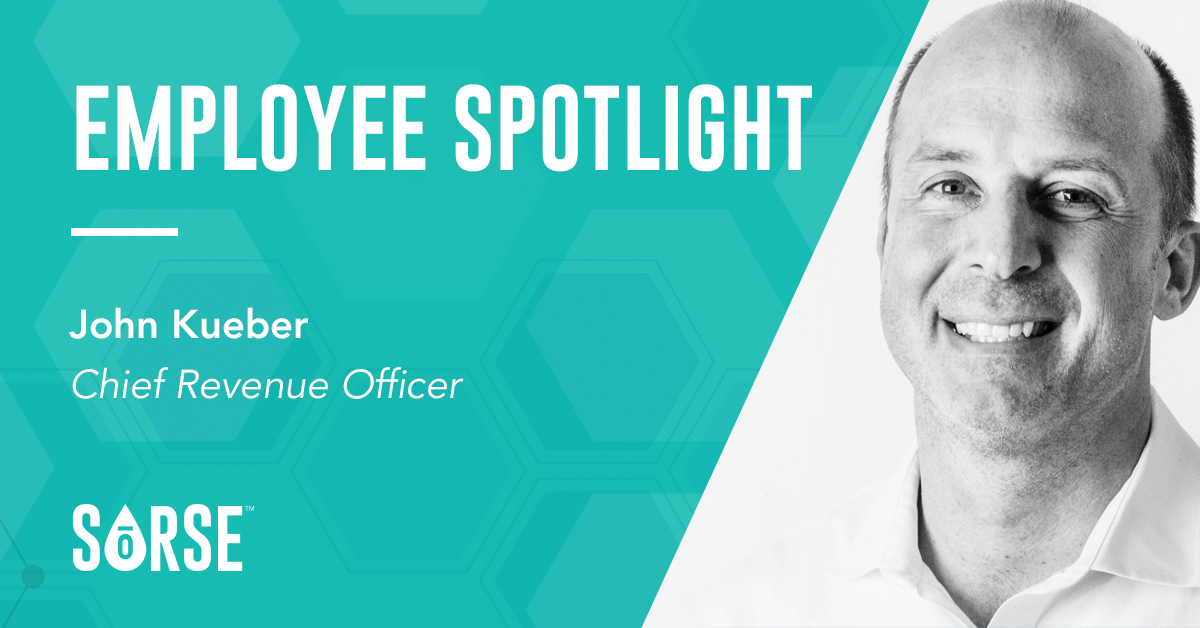
Meet our Chief Revenue Officer, John Kueber, who brings over twenty years of experience as a business executive building companies and developing brands to the team. John loves the challenge of building out new processes, educating new customers, and finding people to manage new projects. When he is not at work, you can find John spending time with his wife and twin daughters who love sports as much as he does or putting miles in on his bike. An accomplished athlete, John has completed an Ironman, summited Mount Rainier two times as well as ten other Cascade peaks, and has ridden over the major cycling passes for the Tour De France and Giro D’Italia.
What have been some significant moments or some highlights in your year at SōRSE?
I’m most proud of what I accomplished in Canada; I was able to find about half a dozen marquee accounts for SōRSE and Valens, and I felt this validated that we can take what we have to another country. It also validated Valens’ initial investment in licensing the technology, and I’d like to think it played a big part in them increasing their investment on the second license. They saw it was working in Canada and hopefully that was a factor in them seeing the opportunity for the other countries where they have licenses. I’m really proud of jumping in feet first, going out and finding those accounts without a ton of direction and helping get that business set up, from messaging to pricing to process, to helping the Valens team build their sales team. It’s all been super rewarding and fun. People were genuinely excited about SōRSE in Canada, and it’s cool when you have a product that people are interested in. Currently I am happy with the changes and the progress that we’re making in the sales team. I feel like we’ve gone from having limited structure to a more solid structure, and we are forming a team with powerful personalities to build up our business.
What do you enjoy about your role and what do you find particularly challenging about it?
In comparison to last year when I was managing my accounts and answering to one person, my new role as CRO has shifted me towards management. The fun thing right now is that we are an early stage company with a startup atmosphere that is trying to reach a national and global market. There is no end of productive work to be done, whether it’s bringing on new customers, building out new processes, or finding people to manage new projects – and all of that is fun. The downside is that every day you’re questioning your priorities and you’re questioning if you’re moving fast enough, using the right amount of capital to go fast… what do you with complete regard to speed, and what do you do a little more slowly and carefully and make sure it’s done right? Every day I’m defining priorities, which is true for most leaders in businesses, but it’s a little more true for this business. I think the cool thing is, unlike a lot of startups, our strong capital base allows us to execute in the right way.
What is your philosophy on sales, and what qualities makes a salesperson successful?
Salespeople have to have their own internal engine. It’s an overused cliché, but they absolutely have to have grit — the ability to stay persistent and tough even when a deal is taking a long time or a period of some lost deals. The most important qualities for me, and two of the hardest ones to hire for, are the ability to be both empathetic and the ability to create a narrative.
To be empathetic, you need to be able to listen to your customer, and be able to repeat back (in different words!) what you hear them saying, and understand what they are going through. That is a skill you have to develop, and a lot of people don’t ever develop it.
Combined with that, you’ve got to be able to create a narrative for the customer: “Here is what you are going through, here is what SōRSE does, and here the way those two things can be woven together.” You have to build a story on how our product can provide a solution for the customer. Humans tend to think in terms of stories, they think in terms of what works well for others; what we are working on is taking data and figuring out how it fits in to the narrative.
Good salespeople also understand when a project is not a good fit. They value the customer’s time, and if a project is not worth doing, they’re not afraid to say so and move on, because they know that if they work hard, they will find better opportunities.
Can you describe your first sales job, and how you learned how to build relationships with customers?
My first sales job was selling programs for the University of Washington crew team. As a freshman you had to sell 100 programs on Saturdays before you could move on with your day. Many of my teammates dreaded this, but one friend and I had a ton of fun with it and would sell 500 programs each, really just by going the extra mile to have fun with the Husky fans walking into the game. If you love your product and love connecting with people, I found you could have a great career with sales. After college, I sold internet advertising for the New York Yankees. That was a lot of fun because it was very early days of the internet, so I was learning a lot about technology while also getting to sell.
Having said that, I did decide early on that while I love to sell, I didn’t want to purely be a professional salesperson. Back in the 90s, if you were 25, a lot of people weren’t comfortable handing you $500,000 to start a company. Once I left my ad sales job, I raised $200,000 from friends and family, and started my first company which I sold for just under $5,000,000 after two years. That was a confidence builder and an experience that made me realize that I had some good entrepreneurial qualities.
More importantly, I also learned an important lesson about conviction from that experience; that first business I built was an early internet commerce store, and I probably had 200 people tell me it was a dumb idea and that it wouldn’t work, and they were proven wrong. Most people really have no clue what’s going to work and what isn’t. If you think your idea is going to work, if you have conviction and passion for your idea, don’t let the haters keep you down.
That experience parlayed into a voice technology business which merged with one of Howard’s companies; then it happened with a media business that was bought by a larger media company. In situations like these, you have to do the selling, you have to do the work, but you also have to have conviction, believe that you’re smart, that you’re doing the right things, and building the right business.
Bringing this back to SōRSE, early when I heard about this opportunity from Howard, I started looking at the CBD and cannabis market – and the conventional, common wisdom out there is that cannabis is weird business for a variety of reasons. Yet once I dug in and looked closely at the marketplace, particularly around CBD, I saw that is was a compelling, good-for-society business. I’m passionate about it, I have convictions around it, I knew I could sell it, and there is room for growth, so it sounded like the right opportunity.
If you were to give a piece of advice just entering the cannabis business as well as someone who has just started at SōRSE, what would it be?
That one is easy: Find a specific problem to solve or a specific solution to create and work hard to meet it. Don’t jump into the cannabis business just for the sake of it. Right now, don’t JUST launch a CBD sparkling drink; it’s been done. Launch a CBD drink that is targeted towards a specific market or provides a certain function. Fill a specific need.
At SōRSE, I think it’s important that we stay lean and stay hungry. We need to work each month with the same hunger that we did in the beginning. Let’s keep up the intensity and enjoy it.
We are at the beginning of a new decade. What was your life like in 2010? What were you doing for fun?
Ten years ago, we were living in Seattle, and my twin daughters were three years old. My wife and I were knee-deep in parenting them. I was COO of a media company, raising my twin girls, and not having much time for anything else. I wouldn’t trade having kids for anything, but it was definitely all encompassing for a few years! Having two little girls waking up at all hours for a few years definitely took it out of me and my wife, Katarina.





